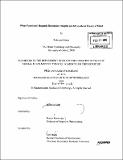| dc.contributor.advisor | Nancy Kanwisher. | en_US |
| dc.contributor.author | Saxe, Rebecca R. (Rebecca Rose), 1979- | en_US |
| dc.contributor.other | Massachusetts Institute of Technology. Dept. of Brain and Cognitive Sciences. | en_US |
| dc.date.accessioned | 2006-03-24T18:14:03Z | |
| dc.date.available | 2006-03-24T18:14:03Z | |
| dc.date.issued | 2003 | en_US |
| dc.identifier.uri | http://hdl.handle.net/1721.1/30039 | |
| dc.description | Thesis (Ph. D.)--Massachusetts Institute of Technology, Dept. of Brain and Cognitive Sciences, September 2003. | en_US |
| dc.description | Includes bibliographical references. | en_US |
| dc.description.abstract | To have a theory of mind is to be able to explain and predict human behaviours and experiences in terms of mental states: beliefs, desires, goals, thoughts, and feelings. In chapters 1 and 2, I use functional magentic resonance imaging (fMRI) to investigate the neural substrate of the theory of mind, in healthy human adults. I conclude (1) that specialised brain regions, including a region of the temporo-parietal junction (the TPJ-M), are selectively engaged when people reason about the contents of other people's beliefs, and (2) that the brain regions associated with belief attribution appear to be distinct from other regions engaged in the representation of goal-directed action, including a region of posterior superior temporal sulcus (the pSTS-VA). In chapters 3 and 4, I consider the implications of these and other neuroimaging results for the mental structure of theory of mind, based on proposals derived from developmental psychology and philosophy. | en_US |
| dc.description.statementofresponsibility | by Rebecca R. Saxe. | en_US |
| dc.format.extent | 131 p. | en_US |
| dc.format.extent | 6727035 bytes | |
| dc.format.extent | 6726843 bytes | |
| dc.format.mimetype | application/pdf | |
| dc.format.mimetype | application/pdf | |
| dc.language.iso | eng | en_US |
| dc.publisher | Massachusetts Institute of Technology | en_US |
| dc.rights | M.I.T. theses are protected by copyright. They may be viewed from this source for any purpose, but reproduction or distribution in any format is prohibited without written permission. See provided URL for inquiries about permission. | en_US |
| dc.rights.uri | http://dspace.mit.edu/handle/1721.1/7582 | |
| dc.subject | Brain and Cognitive Sciences. | en_US |
| dc.title | What functional magnetic resonance imaging can tell us about theory of mind | en_US |
| dc.title.alternative | What fMRI can tell us about theory of mind | en_US |
| dc.type | Thesis | en_US |
| dc.description.degree | Ph.D. | en_US |
| dc.contributor.department | Massachusetts Institute of Technology. Department of Brain and Cognitive Sciences | |
| dc.identifier.oclc | 55089423 | en_US |
